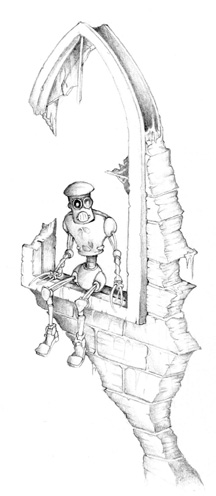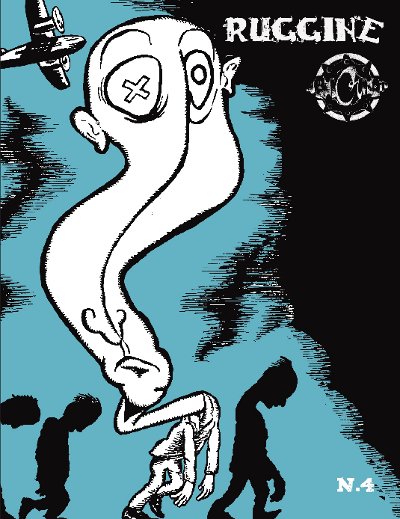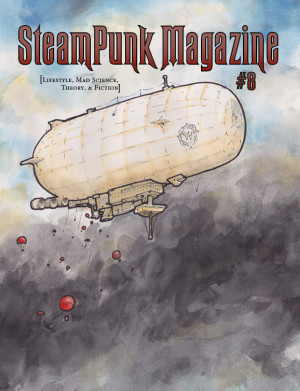 A Collar of Rust
A Collar of Rust
An interview with Collane di Ruggine
by Margaret Killjoy
Ruggine might be the closest thing that SteamPunk Magazine has to a sister publication. Coming out of the Italian radical/squatter scene as SPM had its roots in the US, Ruggine is a journal that sets out to use imagination to challenge the status quo. I was delighted to have a chance to interview two of their writers and editors, and beginning in this issue we will be running the occasional translation of stories from their pages.
SPM: Can you introduce Ruggine to our readers? What does the name mean? What kind of stories do you run?
reginazabo: Ruggine is a fanzine of radical fiction and illustrations. We publish short stories that try to dissect our tragic, pathetic world through irony and imagination, in the belief that metaphors can be sometimes stronger and more convincing than plain, objective, non-fiction essays.
We have a DIY approach to the whole process: our breeding ground is the Italian punk DIY community and the hacker scene, which are widely interconnected since hacker spaces in Italy are often inside squats and social centers. So not only do our authors and illustrators belong to this environment, but also the people who contributed to our graphic layout are at least acquainted with the idea of open-source. Our publications are released with no copyright, or at most under CC licenses, and we also try to use open-source instruments and DIY resources in the graphic layout and distribution: from the open-source software we use for layout (Scribus), to open fonts, to a distribution platform which allows us to find co-producers for our future publications. (Produzioni dal basso, a sort of self-managed Kickstarter ahead of its time.)
In the beginning we were planning to publish books, and our first publication was a short essay on the relationship between the humankind and technology in the light of J.G. Ballard’s works. As we talked about our future projects, decay always was an object of our reflections, so we decided a good name for our DIY publishing house could be Collane di Ruggine, collane meaning “necklaces,” but also “book series,” and ruggine meaning “rust.” So we had our rusty series, but no long text to publish in a book. Instead, we had a lot of short stories we had written and some others we had found in English on the web and wanted to translate. Switching to a fanzine was immediate, and we didn’t have to think much to decide that it would have illustrations: we wanted something
pleasant, that people would wish to pore through at first glance. The title was immediate as well: if the publisher was called “Rust Book Series,” the magazine could only
be, simply, “Rust.”
Pinche: Ruggine is a small DIY fanzine. We all belong to this weird community made of squatters, hackers, anti-psychiatric activists, punks, and similar creatures. One day we started to reflect on the fact that in this community there is a lot of non-fiction, that we create wonderful music, write amazing theater pieces, and build houses, but don’t produce any fiction. We started to think that our community needed to recreate its imagination, which perhaps had been made too sterile by years of day-to-day struggles and frustrations. Ruggine’s authors are very different people, but somehow they share a passion for “imaginary literature” (we like to use this expression, by Italo Calvino, since it adds a different scope to the idea of science fiction) and love to plunge reality into a
richer dimension. Ruggine never had a determined “editorial line”: we choose the stories we publish by inhaling them, looking for that imaginary atmosphere that goes deep to the heart of the matter even when the plot is about apparently far-away situations. We look for a way of writing that is somehow archetypical, that talks to people in a way that is ironically more direct than a thousand news articles could be.
Rust is one of these archetypes: it is the result of a something that used to be a certain material but is now changing into something else, it is the past turned into future in a painful, beautiful way. We imagine the exploded world of this non-future of ours as a rusty world covered with vegetation. Continue reading


 Con un po’ di ritardo accademico siamo lieti di segnalarvi l’uscita dell’ottavo numero dello
Con un po’ di ritardo accademico siamo lieti di segnalarvi l’uscita dell’ottavo numero dello 



